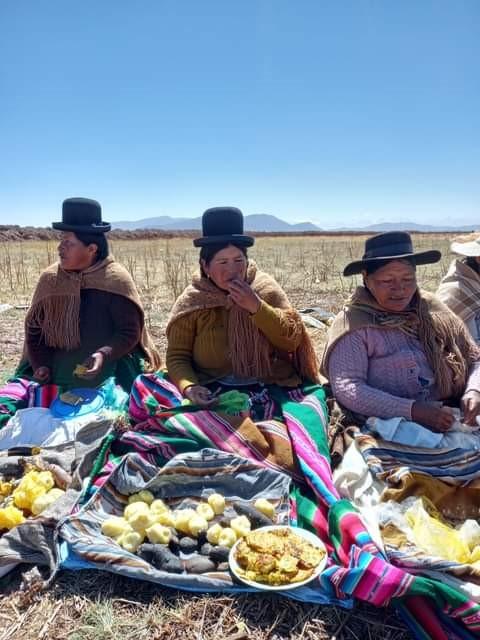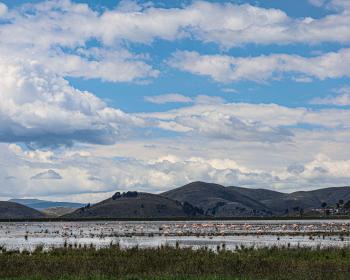
In October 2023, Cultural Survival and our partner organization Qhana Pukara Kurmi submitted a joint alternative stakeholder report on the situation of Indigenous rights in Bolivia for the 111th session of the Committee on the Elimination of Racial Discrimination (CERD), which will take place in Geneva from November 20-December 8, 2023.
The CERD is the treaty monitoring body for the International Convention on the Elimination of All Forms of Racial Discrimination (ICERD), and one of nine International Human Rights Treaties within the UN system. The ICERD is legally binding for the 175 countries which have ratified it to date. The CERD was the first Treaty Monitoring body to be established within the UN System and is responsible for reviewing the compliance of all State parties with the provisions of the ICERD. It also makes recommendations as to how States should change their policies and practices to comply with their obligations under the ICERD to eliminate racial discrimination in their countries.
The submitted alternative report is based on the rights violations suffered by the eight Quechua communities composing the Ayllu Acre Antequera, an association of grassroots Indigenous communities and ayllus in the department of Oruro representing a total of 3,264 inhabitants. However, Indigenous Peoples experience violations of their rights related to mining in several parts of the country and the case of the Ayllu Acre Antequera can be extrapolated to many other regions in Bolivia.
In 2013 the companies Illapa and Sinchi Wayra, branches of the Swiss company Glencore, signed a new contract with the Bolivian Mining Corporation (COMIBOL) for another 15 years for the exploitation of zinc, silver, and lead in the Bolívar mining project, which is located in the territory of Ayllu Acre Antequera and the Quechua Indigenous communities that comprise it.
Mining activities in this Indigenous territory have a series of impacts including water pollution and scarcity of water sources, criminalization of ancestral authorities for defending their land, and impacts on culture and community life, all of which generate structural discrimination against the Quechua people who inhabit these lands. Some people have described it as living in a “toxic desert."
In an already arid region, the mine is using far more water than allowed under its lease, and community members have witnessed rivers and wells being polluted and the ecosystem drying up. The mine uses 800,000 liters of water per day and discharges 80 liters of wastewater per second into the Antequera River. Much of the remaining water has been polluted by the mine and is not suitable for human or animal consumption or for irrigating crops. Technical reports show evidence of the presence of arsenic, lead, cadmium, zinc and cyanide sulfates in this territory, exceeding the maximum levels allowed in Bolivia, which can cause serious health problems for people and animals living in this polluted land. Many families have had to get rid of their livestock, which is of vital importance to their livelihoods and its disappearance has a great impact on the communities’ food and economic sovereignty. Some community members report that pipes carrying toxic substances cross their gardens and houses.
Today, the destruction of territories has gone so far that communities are being confined to specific territories in an attempt to escape pollution in order to access water and produce supplies. However, these territories are becoming smaller and smaller and people cannot sustain themselves with the few existing natural resources. As a result, many of the Indigenous people who have traditionally lived in the area have been forced to leave their lands. This forced migration separates the youth from the elders of the community, preventing the inheritance of cultural knowledge and threatening the cultural survival of these communities.
In addition, those who dare to denounce these impacts face criminalization. People living in the Ayllu Acre Antequera testify that they often feel threatened and watched by the Illapa company. If they complain, they are threatened with criminal prosecution or the dismissal of family members who work in the mine. Several of their leaders have suffered injuries to their physical, psychological, and moral integrity and are victims of judicial persecution. This harassment is not only directed at individuals but is part of a terror campaign directed at the Indigenous population in general.
Women in the Ayllu have suffered differentiated impacts, suffering verbal threats, racist and sexist insults, physical aggressions, touching, and intimidation by members of the mining union.
In addition, Indigenous Peoples’ internationally protected right to give or withhold their Free, Prior and Informed Consent for any activity taking place in their territory or any measure affecting them has been violated. The contract between Illapa and the COMIBOL for the Bolívar project was finalized without any regard for this process and without any interaction with the eight affected communities.
In this context, Cultural Survival and Qhana Pukara Kurmi urge the members of the Committee on the Elimination of Racial Discrimination to make the following recommendations to the Plurinational State of Bolivia:
- Implement protection measures in favor of human rights defenders and women of the Ayllu Acre Antequera, detailing the differentiated measures with a gender perspective.
- Implement measures to clarify the attacks against the inhabitants of the Ayllu Acre Antequera and establish measures to avoid re-victimization such as comprehensive support for the victims and reparations for the attacks suffered.
- Guarantee the life and physical integrity of the people living in the Ayllu Acre Antequera, especially the Indigenous authorities and community members who are defending their territories, environment, and human rights.
- Ensure that the protection measures provided by the State are in accordance with a comprehensive risk analysis, agreed upon with the beneficiaries, and that the relevant inter-institutional coordination is carried out to safeguard their life and integrity, considering territoriality, gender, and their status as human rights defenders, among others.
- Take measures to mitigate the effects on the human right to a healthy environment.
- Recognize the right to self-determination of Indigenous Peoples and the resolutions issued by the Justice Council of the Ayllu Acre Antequera in accordance with international human rights standards.
- Carry out an emergency intervention in the Ayllu Acre Antequera by the responsible entities at both the national and international levels.
- Ensure the provision of drinking water for the people and animals that inhabit the Ayllu Acre Antequera.
- Cease the harassment, defamation, and discrimination against the Indigenous authorities by the mining radio station 16 de Marzo owned by the mining company and the members of the Bolívar mine union.


